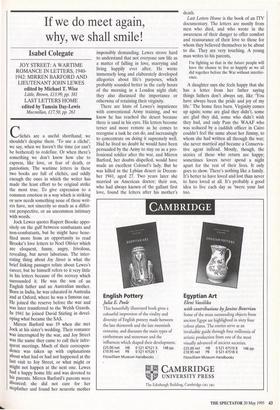If we do meet again, why, we shall smile!
Isabel Colegate
JOY STREET: A WARTIME ROMANCE IN LETTERS, 1940- 1942: MIRREN BARFORD AND LIEUTENANT JOHN LEWES edited by Michael T. Wise Little, Brown, £13.99, pp. 381 LAST LETTERS HOME edited by Tamsin Day-Lewis Macmillan, £17.50, pp. 261 Cliches are a useful shorthand; we shouldn't despise them. `To use a cliché', we say, when we haven't the time (or can't be bothered) to redefine. Or when there's something we don't know how else to express, like love, or fear of death, or patriotism. The wartime letters in these two books are full of clichés, and oddly enough the ones in which the writer has made the least effort to be original strike the most true. To give expression to a common emotion in a way which is striking or new needs something none of these writ- ers have, not sincerity so much as a differ- ent perspective, or an uncommon intimacy with words.
Jock Lewes quotes Rupert Brooke appo- sitely on the gulf between combatants and non-combatants, but he might have bene- fited more from an opportunity to read Brooke's love letters to Noel Olivier which are eloquent, funny, angry, frivolous, revealing, but never laborious. The inter- esting thing about Joy Street is what the brief linking passages relate about Lewes's career, but he himself refers to it very little in his letters because of the secrecy which surrounded it. He was the son of an English father and an Australian mother. Born in India, he was educated in Australia and at Oxford, where he was a famous oar. He joined the reserve before the war and was later transferred to the Welsh Guards. In 1941 he joined David Stirling in devel- oping what became the SAS.
Mirren Barford was 19 when she met Jock at his sister's wedding. Their romance was interrupted by the war, and Joy Street was the name they came to call their infre- quent meetings. Much of their correspon- dence was taken up with explanations about what had or had not happened at the last visit to Joy Street, or what might or might not happen at the next one. Lewes had a happy home life and was devoted to his parents. Mirren Barford's parents were divorced; she did not care for her stepfather and found her neurotic mother impossibly demanding. Lewes strove hard to understand that not everyone saw life as a matter of falling in love, marrying and living happily ever after. He wrote immensely long and elaborately developed allegories about life's purposes, which probably sounded better in the early hours of the morning in a London night club; they also discussed the importance or otherwise of retaining their virginity.
There are hints of Lewes's impatience with conventional Army training, and we know he has reached the desert because there is sand in his eyes. His letters become terser and more remote as he comes to recognise a task he can do, and increasingly to concentrate on doing it supremely well. Had he lived no doubt he would have been persuaded by the Army to stay on as a pro- fessional soldier after the war, and Mirren Barford, her doubts dispelled, would have made an excellent Colonel's lady. But he was killed in the Lybian desert in Decem- ber 1941, aged 27. Two years later she married an American doctor; their son, who had always known of the gallant first love, found the letters after his mother's death.
Last Letters Home is the book of an ITV documentary. The letters are mostly from men who died, and who wrote in the awareness of their danger to offer comfort and reassurance of their love to those for whom they believed themselves to be about to die. They are very touching. A young man writes to his parents,
I'm fighting so that in the future people will have the chance to live as happily as we all did together before the War without interfer- ence.
A daughter says she feels happy that she has a letter from her father saying things fathers don't always say, like 'You have always been the pride and joy of my life.' The home fires burn. Virginity comes up again; some are glad they didn't, some are glad they did, some who didn't wish they had, and only Pam the WAAF who was seduced by a caddish officer in Cairo couldn't feel the same about her Jimmy, to whom she had written all through the war; she never married and became a Conserva- tive agent instead. Mostly, though, the stories of those who return are happy; sometimes lovers never spend a night apart for the rest of their lives. It only goes to show. There's nothing like a family. It's better to have loved and lost than never to have loved at all. It's probably a good idea to live each day as 'twere your last too.


































































 Previous page
Previous page